
We knew there was a reason we loved chickpeas. “They're packed with protein—three grams for every two tablespoons,” says Dr. Daryl Gioffre, a New York City-based nutritionist and author of Get Off Your Acid. “Chickpeas are high in lysine, and tahini is a rich source of the amino acid methionine. Individually, [chickpeas and tahini] are incomplete proteins, but when you combine them to make hummus, they create a complete protein.”

You probably associate oatmeal with the early morning hours, but it has plenty of nighttime benefits, too. For starters, oats are a complex carb that break down slowly, controlling blood sugar spikes that might mess with your sleep. And if you find a warm bowl of oatmeal cozy and soothing, you’re not alone. According to a Columbia University study, the carbs actually work with your brain to release the neurotransmitter serotonin, which coaxes you into a tranquil state and helps your body produce melatonin for a restful night of sleep.

You’re trying to quell a craving, not put yourself in a full-on food coma. That’s where popcorn comes into play. The addictively crisp, salty snack is naturally light (a whopping three-cup serving clocks in at about 100 calories), so you can nosh without getting weighed down before bed. Oh, and there’s also the complex carb factor again—a whole-grain bedtime snack will stick to your ribs much longer than a cookie or bowl of ice cream…as tempting as those sound.

We already know that Greek yogurt is a great source of protein, but we had no idea that it could help us catch some ZZZs, too. The calcium in yogurt helps your brain use tryptophan and melatonin, and one University of Pennsylvania sleep study even suggests that it can help you stay asleep longer. Instead of loading up on sugary sweetener (which can potentially throw your blood sugar out of whack), top your bowl with fresh fruit and crunchy chia seeds.

Who knew our childhood favorite was actually a prime midnight snack? Here’s why: According to the National Sleep Foundation, peanut butter is a natural source of tryptophan (aka an amino acid that induces sleepiness). And carbohydrates make tryptophan more available to the brain. Thhe combination of protein-rich peanut butter and complex carbs is pure bedtime magic.
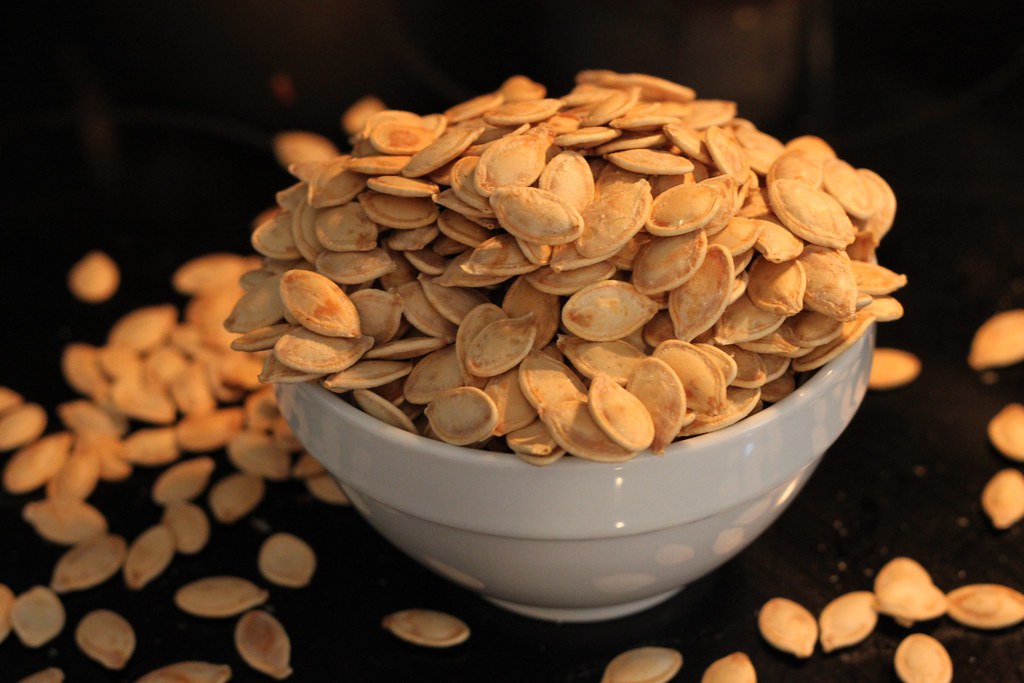
What’s salty, crunchy and a surefire way to put you to sleep? Pumpkin seeds, of course. According to the American Sleep Association, these guys are a good source of the sleep-inducing mineral magnesium and amino acid tryptophan. They're also packed with zinc, which can help the brain convert that tryptophan into serotonin.

Remember how your high school track coach told you to eat bananas to prevent or soothe leg cramps? That’s because bananas contain potassium, which aids in muscle relaxation. Combine that with peanut butter for a winning midnight snack, since it's not only delicious but also full of healthy fats to keep you satisfied, says the Cleveland Clinic.

If you’re lazy like us, you don’t want to do more cooking and dishes just for a snack. A small handful of nuts fits the no-cook bill, thanks to their high protein content and healthy fats. Gioffre says that nuts (specifically organic ones) “are nutritional powerhouses that can help regulate blood sugar level, fight inflammation, decrease hunger urges, help weight loss and lower your risk of cardiovascular disease.” His go-tos? “Raw almonds, pistachios and macadamias. [They're] high in healthy fats, they suppress hunger, optimize brain function and help you burn fat.”

Speaking of nuts, almond butter is an equally convenient grab-and-go (er, snooze) option. And considering that a quarter cup of almonds contains 24 percent of your daily recommended magnesium intake, plus tryptophan and potassium, they’re a no-brainer for late night hunger pangs. Magnesium is a great relaxation mineral too, so it will help you wind down as bedtime approaches.
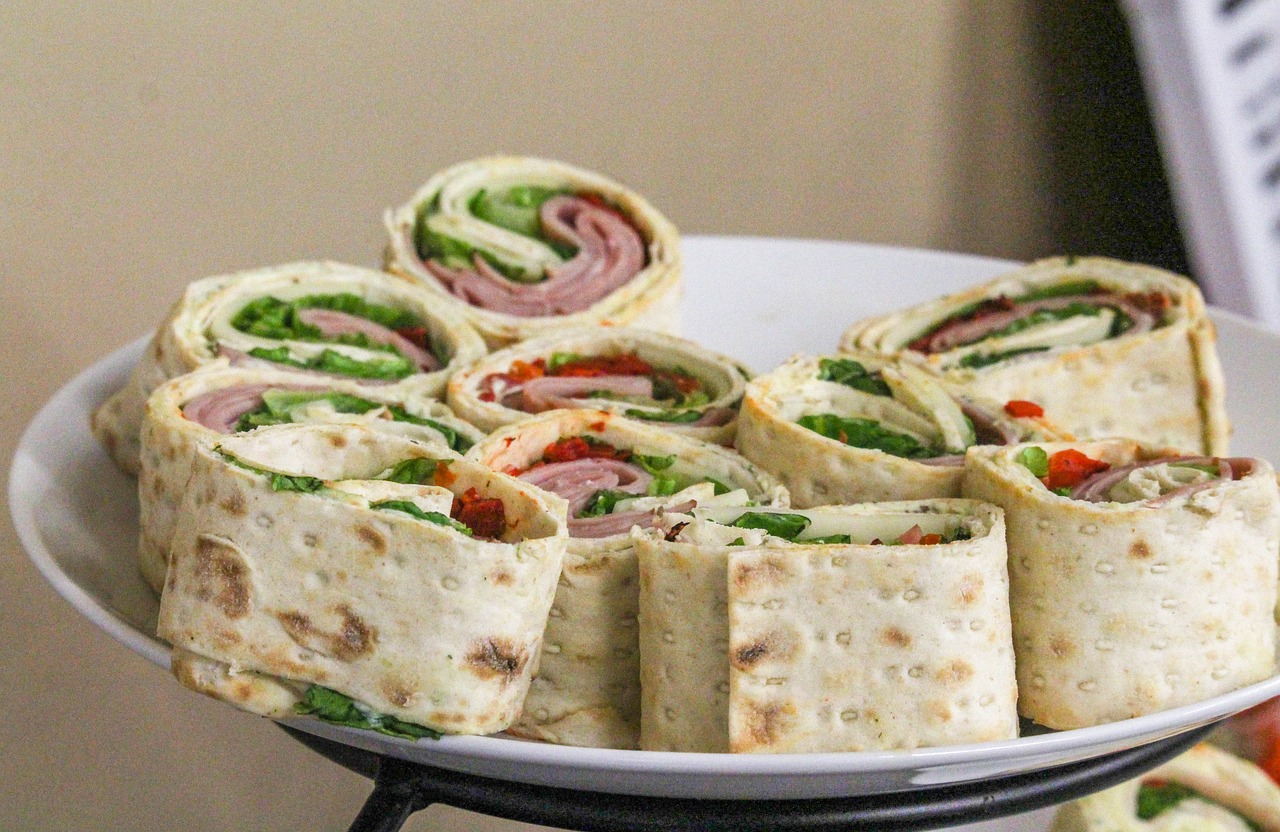
You’ll never forget when your Uncle Bill fell asleep right in the middle of the Thanksgiving feast. It was probably thanks to the turkey, which is known for being rich in serotonin-producing tryptophan, and that’s exactly what makes it a smart choice for a midnight snack. Pair it with whole-grain bread to sneak in some complex carbs (you can also go the route of jasmine rice or sweet potatoes, says Northwestern Medicine), or keep it low-cal and layer some slices in a lettuce wrap instead.
![]()
Cottage cheese got a bad rap for being a bland, boring weight-loss staple back in the day, but it’s a hidden gem for insomniacs (not to mention tasty to boot). The lean protein (which comes from slow-digesting casein) helps boost that aforementioned serotonin, and according to a recent study from Cambridge University, can actually help you hit your weight-loss goals while you sleep by helping you feel more satiated and increasing your resting energy expenditure the next morning. Want to boost the snooze-factor? Top a half-cup serving with raspberries for a 100-calorie midnight snack with an added touch of melatonin.
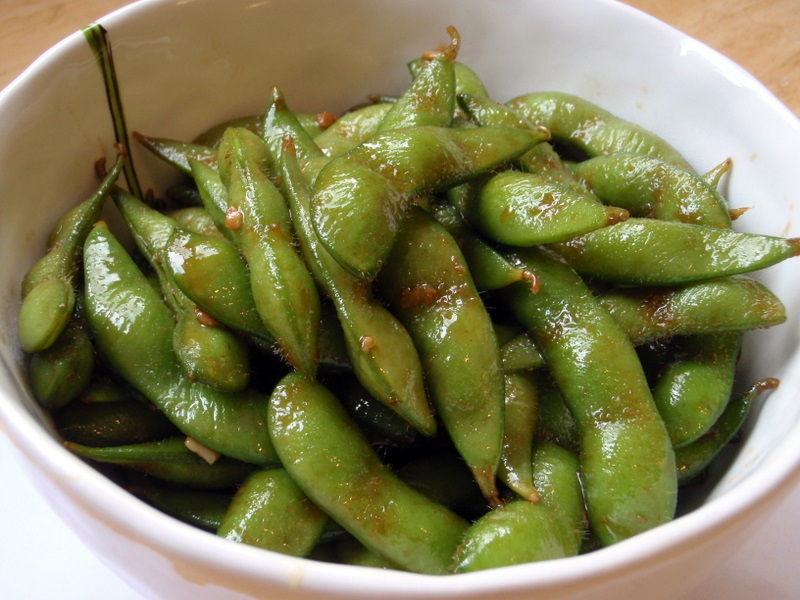
Memorize this equation: Protein plus fiber equals the best night’s sleep of your life. Edamame (aka soybeans in their pods) have both going for them, so it’s a natural choice when you need a quick bite. And specific compounds in soy (called soy isoflavones) have been found to potentially increase the duration of sleep, according to this Japanese study.

By now, you can probably guess why eggs are a healthy midnight snack: They’re protein-rich and full of tryptophan. The American Sleep Association says they might make you sleepy for that reason, but we also love that they’re portioned and packaged for easy eating. Plus, you definitely already have a stash of jammy eggs in your fridge for topping salads and toast, right?
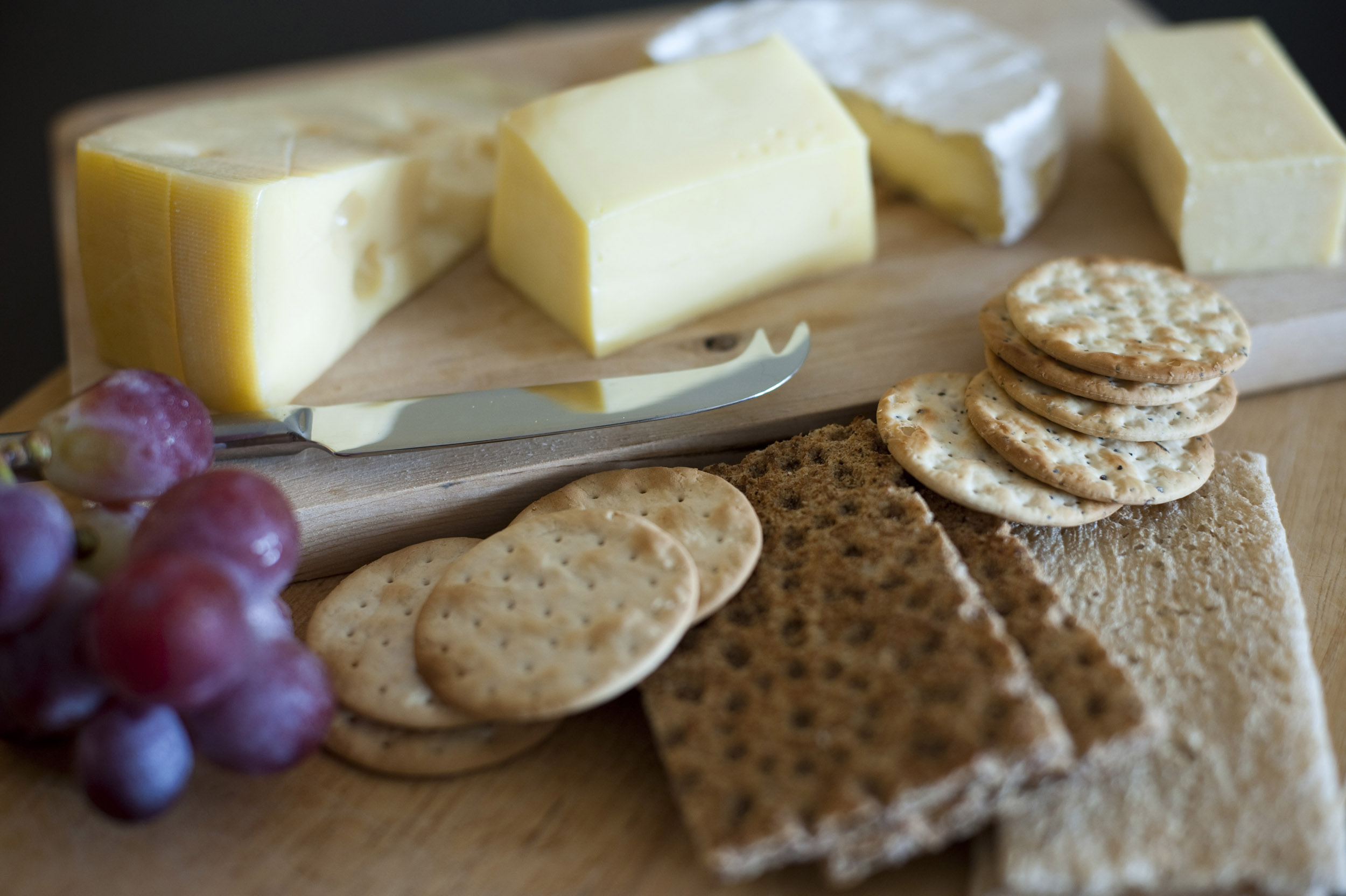
When it comes to sleep, cheese is a surprisingly sound choice. That’s because it’s high in calcium, which has been tied to better sleep. It’s also loaded with protein, plus some tryptophan and melatonin for good measure. Pair a few slices of cheese with some whole-grain crackers, sprouted bread or apple slices for the ultimate protein-carb combination.

Good news for millennials who worship at the avo toast altar: Dr. Gioffre calls the fruit (yep, it’s a fruit) “God’s butter.” That’s because it has “a nice balance of healthy fats, more potassium than bananas and plenty of fiber to keep your digestion in check.” Want to bring it up a notch? Dr. Gioffre suggests making your toast with sprouted bread, tomato, extra-virgin olive oil, cumin, sea salt, crushed black pepper and jalapeño for a little extra kick. Part midnight snack, part gourmet meal.

You can never go wrong with raw veggies. The trick is making them exciting enough that you actually want to eat them. (This roasted red pepper sauce will do just that, but you can also lean on whatever dressing you have stowed away in the fridge.) The only caveat? Steer clear of veggies that contain a lot of fiber (like carrots and beets) to avoid being bloated and gassy before bed, says Sleep Health Solutions. Cruciferous veggies, like broccoli and cauliflower, are also best avoided late at night because they contain a large amount of insoluble fiber. Instead, go for lettuce, kale, tomatoes and even fruits like kiwi and cherries.
![]()
If avocado toast is on the to-snack list, then so is guacamole. As Dr. Gioffre stated above, avocado's healthy fats will keep you full and its potassium content could help you sleep better. Additional ingredients in the guac can also boost your slumber: Tomatoes are loaded with lycopene, which aids in heart and bone health, as well as sleep-inducing potassium, while tryptophan-rich onions help lower your stress level and aid in relaxation.
![]()
Why should mornings get to have all the fun? Smoothies can be sipped at night too, and they're as healthy as whatever you put in them. Blending many sleep-inspiring foods like tart cherry juice, pistachios or avocado could help you get maximum cozy. If you use kefir or yogurt in the smoothie, the probiotics could also possibly help the release of serotonin in your brain, says nutrition expert Frances Largeman-Roth, RDN. Add magnesium-rich hemp or chia seeds for even more sleep support.

Our kryptonite: Potato chips. We can eat a million of 'em without even blinking, but sleeping so soon after all that salt and oil leaves us feeling bloated and greasy. Luckily, these zucchini alternatives are just as crisp and tasty—minus the frying. But there are a slew of other vitamin-rich types to snack on too, like turnip chips, carrot chips and sweet potato chips.

We've never met a French fry we didn't like, but since these are baked instead of fried, they have way less fat—and are less messy to prepare. They're also made with sweet potatoes, which contain a ton of vitamins and minerals, plus a bit of protein to hold you over before bedtime. But most importantly, they're teeming with relaxing potassium, magnesium and calcium (especially if you leave their skin on).

Protein is the way to go when you feel a late night craving coming on, as long as you don't consume too much of it. Eating a large portion before bed may keep your body up for the sake of digestion, plus too much pre-bedtime protein may give you too much energy before hitting the hay. But if you're craving something savory and filling, it's OK to have a small piece or two (especially if you're on a diet like keto or Paleo). Make your own instead of leaning on store-bought processed jerky. Jerky is a great source of protein and iron;

Like oatmeal, cereal is just as good for you at night as it is first thing in the morning. Since many corn-based cereals contain high-glycemic carbs, they could potentially reduce the time it takes for you to fall asleep. Even better, milk is a great source of calcium, a mineral that's essential for the production of melatonin. Choose something with minimal sugar and use low-fat milk to keep your calories low and to make the meal more digestible.
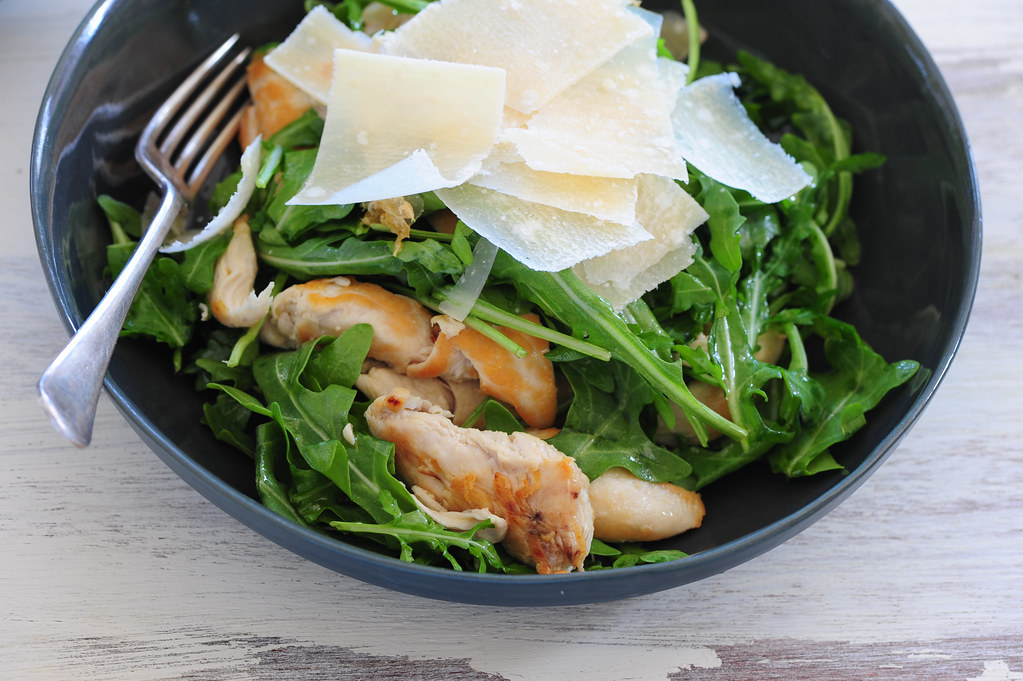
White rice's high glycemic index means that it will give your blood sugar and insulin a natural boost, consequently helping the tryptophan lull your brain to sleep, says the American Sleep Association. Not to mention that rice is high in magnesium, which also aids in sleep, and it's easy to digest, according to dietitian Samina Qureshi, RD. Want to make it even more satisfying and soothing? Pair it with green tea broth and even salmon, if you're feeling extra hungry—fatty fish's high levels of vitamin D may help improve the quality of your sleep too.
![]()
For those nights when your heart cries "ice cream," but your brain says "we can do better than that." Here's the catch: Sorbet tends to be lower in fat than dairy ice cream, but just as high in sugar. Finding a sugar-free one—or better yet, making your own—is important to make sure you don't get a sugar rush before hitting the pillow. (On that note, a 2014 study found that a diet high in sugar was linked to poor sleep overall.) It's as simple as blending frozen fruit with a splash of milk. (Frozen yogurt is also a solid ice cream alternative.)

You love hummus—why not celebrate these tiny gems in their smashed form? Chickpeas boast protein, fiber, vitamins and minerals, making them a popular healthy choice. But they also have a ton of sleep-inducing tryptophan, complex carbs and folate, which can help regulate your sleeping patterns. The actual measurements and ingredients here can be adjusted to your liking, so taste as you go and add more or less to make it delicious to you.